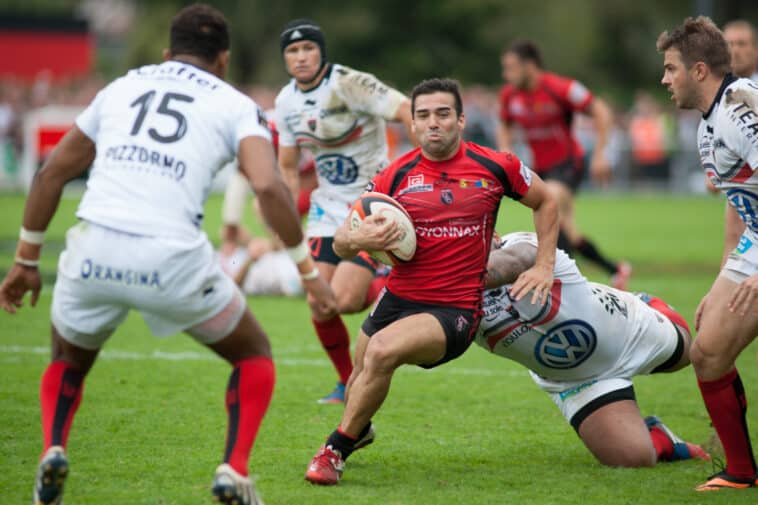When it comes to the duration of rugby games, there is a surprising fact that many people may not be aware of. Unlike many other sports, rugby matches can last for a considerable amount of time, often exceeding the typical 90-minute timeframe that is seen in sports like soccer. It is a game that demands physical prowess, mental agility, and tactical prowess, which all contribute to the length of matches.
The duration of a rugby game can vary depending on the level of play. In professional rugby, a standard match consists of two halves, each lasting 40 minutes. However, with additional stoppage time and breaks for substitutions and injuries, the overall playing time can extend to 80-90 minutes. This extended playtime allows for a more strategic and dynamic game, giving players and teams the opportunity to showcase their skills and adapt their strategies throughout the match.
Rugby games typically last for 80 minutes, divided into two halves of 40 minutes each. However, the actual length of a rugby game can vary depending on factors such as injuries, substitutions, and time spent on stoppages. Including half-time intervals and additional time for injury or other delays, a rugby game can last around 90 to 100 minutes. It’s important to note that professional rugby matches may have longer game durations compared to amateur or recreational games.

The Duration of Rugby Games Explained
Rugby is a sport known for its physicality, strategy, and intense gameplay. As with any sport, understanding the duration of rugby games is essential for players, coaches, and spectators. Unlike some other sports, rugby games do not have set time limits. The duration of a rugby game can vary depending on several factors, including the level of play, the competition format, and the pace of the game. In this article, we will explore the average length of rugby games, the different formats that impact game duration, and some factors that can influence the overall time it takes to complete a match.
Before delving into the specifics, it’s important to note that rugby games can generally be divided into two categories: fifteens and sevens. Fifteens involves teams of 15 players on each side, while sevens involves teams of seven players. The duration of games in these two formats can differ significantly. Now, let’s dive deeper into the average length of rugby games and what contributes to their duration.
The Average Length of Rugby Games
On average, a fifteens rugby game can last anywhere from 80 to 90 minutes. This duration is divided into two halves, with each half lasting 40 to 45 minutes. There is also a halftime break, typically around 10 minutes. However, it’s important to remember that these are just average times, and the actual duration of a match can vary depending on various factors.
Sevens rugby games, on the other hand, are shorter in duration. A typical sevens match lasts for 14 minutes, divided into two halves of 7 minutes each. Similar to fifteens, there is also a halftime break of a few minutes.
While these are the standard durations for rugby games, it’s crucial to keep in mind that additional time can be added at the end of each half to make up for stoppages due to injuries, substitutions, or time wasted during set pieces. This additional time is commonly referred to as “injury time” or “added time.” The referee has the discretion to determine the amount of added time based on the events that occurred during the game.
Now that we have discussed the average length of fifteens and sevens rugby games let’s explore the different variations in game duration due to formats and competitions.
Factors Affecting Game Duration: Formats and Competitions
While the average durations mentioned above provide a general idea of how long a rugby game lasts, it’s important to consider that the actual time can vary based on the format and level of play. Different formats and competitions can have distinct rules that impact the game duration.
Rugby Union and Rugby League
Rugby as a sport can be broadly divided into two categories: rugby union and rugby league. The duration of games can differ between these two codes.
In rugby union, the standard format consists of 80-minute games (40 minutes per half), as mentioned earlier. However, certain variations exist, such as the shorter format known as Rugby X, where each half lasts only 10 minutes. Additionally, in some lower-level competitions, game durations may be reduced to accommodate schedules or other logistical reasons.
In rugby league, the game duration is shorter compared to rugby union. In most professional rugby league matches, the games generally consist of two halves of 40 minutes each, totaling 80 minutes.
It’s worth noting that these are the standard durations for these formats, but variations can exist based on competition rules or other factors specific to certain matches or tournaments.
International Test Matches and Major Tournaments
International test matches and major tournaments, such as the Rugby World Cup, have specific regulations regarding game duration. In international test matches, the standard duration remains 80 minutes, divided into two halves. However, in certain situations, such as extra time in knockout stages or sudden-death scenarios, additional time may be added to determine the winner.
During major tournaments like the Rugby World Cup, the duration of games remains the same as international test matches. The tournament follows a strict schedule, and the duration is crucial to ensure the smooth running of the event.
Now that we have explored the variations in game duration due to formats and competitions, let’s delve deeper into some factors that can influence the overall time it takes to complete a rugby match.
Factors Affecting Game Duration: Other Considerations
While there are standard durations for rugby games, certain factors can impact the overall time it takes to complete a match. These factors may include:
- Stoppage time due to injuries: If players get injured during the game and require medical attention, additional time will be added to the match.
- Substitutions: The process of making substitutions, especially when multiple players are being replaced, can take time and contribute to the overall duration.
- Set pieces: Scrum resets, lineouts, and other set pieces may require multiple attempts, leading to more time being added to the game.
- Injury management: If an injury occurs that requires more extensive assessment or treatment, the game may be paused for an extended period.
- Time wasted during restarts: Occasionally, players may take longer than usual during restarts, resulting in additional time being added by the referee.
These factors are not exhaustive but provide an understanding of some elements that can extend the duration of a rugby game. It’s essential for players, coaches, and spectators to be aware of these possibilities.
Conclusion
The duration of rugby games can vary depending on various factors, including the format, level of play, and competition regulations. On average, fifteens rugby games typically last around 80 to 90 minutes, with sevens matches lasting approximately 14 minutes. However, these times are subject to change based on stoppages, added time, and other considerations.
Understanding the duration of rugby games is crucial for all those involved in the sport, as it allows for better planning and strategizing. Knowing the expected game length enables players and coaches to manage their energy levels effectively, while spectators can plan their viewing experience accordingly.
| Header 1 | Header 2 |
| Row 1, Column 1 | Row 1, Column 2 |
| Row 2, Column 1 | Row 2, Column 2 |
Key Takeaways: How Long Are Rugby Games?
- Rugby games typically last for 80 minutes.
- This includes two halves of 40 minutes each, with a 10-minute halftime break.
- In professional rugby, additional time may be added for stoppages during the match.
- The game clock stops for injuries and other interruptions, so the actual time can vary.
- A game of rugby can last anywhere from 90 minutes to over 2 hours, depending on the level of play and any delays.
Rugby games can vary in length depending on the level of competition and the type of game being played. A typical professional rugby match lasts around 80 minutes, divided into two halves of 40 minutes each.
However, it’s important to note that the actual time of play can be longer due to stoppages for injuries, substitutions, and time-wasting tactics by the teams. Including these stoppages, a rugby match can last between 90 to 100 minutes.





GIPHY App Key not set. Please check settings